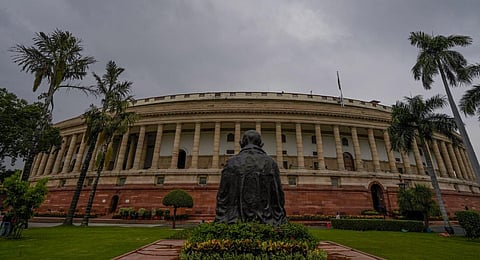

NEW DELHI: Parliament recently passed the contentious Biological Diversity (Amendment) Bill, 2021, which the government said would promote commercialisation of Indian medicine systems, cultivation of wild medicinal plants and draw foreign investment in the sector. However, critics fear it could open the gates for exploitation of bio-resources.
The Biological Diversity (Amendment) Bill was first introduced in December 2021 in the Lok Sabha and subsequently referred to a 21-member Joint Parliamentary Committee.
Union Minister for Environment, Forest and Climate Change, Bhupendra Yadav said the amendments intend to mitigate the climate change crisis under the Paris Climate Accord 2015. “The new amendment will promote ease of doing business, support research and cooperation while mitigating the triple crisis of climate change, desertification and loss of biological resources,” Yadav assured Parliament.
However, a closer look at the amendments suggests they could lead to rampant exploitation of bio-resources, spur bio-piracy and undermine the rights of its conservators or holders.
Background
Enacting the biological diversity law in India had its context. In the early 1990s, India had been the target of bio-piracy – scientific colonialism – as Indian products like neem, turmeric, tamarind, Basmati and Darjeeling tea were patented by foreign firms for commercial exploitation. Many underdeveloped countries were under similar attack from big corporations.
In June 1992, the Convention on Biological Diversity (CBD) was negotiated and signed by nations at the UN Conference on Environment and Development's Earth Summit at Rio de Janeiro in Brazil. The Convention for the first time recognised the important contribution of indigenous people in conservation and sustainable use of bio-resources through their traditional knowledge, practices and innovations. Equitable sharing of benefits with such people arising out of utilisation of their traditional knowledge, practices and innovations was also agreed upon.
The Convention came into force on December 29, 1993. India became a party to it in 1994. At present, there are 175 parties to this Convention.
After that, India enacted the Biodiversity Act 2002 to protect various aspects of biodiversity, including the conservation of habitats, land races, folk varieties and cultivars, domesticated stocks and breeds of animals, micro-organisms, and the accumulation of knowledge related to the area’s biological diversity.
Under the Act, a National Biodiversity Authority was constituted, which formed as many as 2.77 lakh Biodiversity Management Committees (BMCs) to prepare a legal document, the People’s Biodiversity Register (PBR), which would be a comprehensive account of local bio-resources along with related traditional knowledge and practices of the concerned area. As of now, BMCs have prepared around 2.67 lakh PBRs.
New amendments
The 2002 Act has been successful in protecting India’s bio-resources. But later, the government felt the need to bring foreign investment and innovation into the sector, so they amended the Act. The amendments mostly address the concern of the pharma industry and traditional medicine practitioners using bio-resources.
But experts argue the amendments reduce the 'say' of the locals, introduce ambiguities in different sections and replace tough punishments with penalties, which may not be sufficient deterrents for the violators.
The amendments treat foreign-controlled companies registered in India as Indian companies and give them access to biological resources and associated knowledge. They also facilitate easier patents involving biological resources obtained from India.
Furthermore, they weaken the 'say' of local communities in benefit-sharing though they are conservers of biodiversity or creators or holders of traditional knowledge. Another amendment removes the benefit-sharing mechanism from research, bio-survey, bio-utilisation and practitioners of traditional medicines from the benefit mechanism.
Furthermore, the amendment decriminalises offences and makes them punishable with a penalty. Earlier, the crimes were punishable by up to five years in jail and a fine, which is now replaced with a penalty. The penalty is between Rs 1 lakh and Rs 50 lakh, and in case of continuing contravention, there may be an additional penalty of up to `1 crore. Also, the penalty decisions will be subject to an inquiry instead of a judicial process.